- Home
- Niccolò Ammaniti
Anna Page 9
Anna Read online
Page 9
At the top of the slope she found herself looking out over a rolling plateau covered with wheat and clumps of broom, and bristling with wind turbines, like so many pinwheels stuck into the land by some giant.
In the past she’d sometimes looked up at them from the plain, from where they’d seemed tiny and out of reach. She’d never imagined they were so huge.
Maybe she’d be able to see the hotel from the top of one of them.
The first one didn’t seem far away; she’d only have to cross a field which sloped down into a narrow cleft and rose up again to a ridge. She hesitated for a moment by the roadside, then stuck her thumbs under the straps of her rucksack and set off.
After a few steps she was chest-deep in ears of wheat which scratched her arms and legs. Crickets darted around her. A pheasant flew up from the golden carpet, uttering its hoarse cries, then dropped down again further off. It took longer than she’d expected, but eventually she came to a square podium which emerged from the yellow crops like a concrete island.
Viewed from below, the tower was so tall the top was out of sight. An aluminium walkway led up to a small door that had been wrenched off its hinges and was hanging askew. An uninviting smell came from inside.
Anna took out her torch and shone it into a narrow spiral staircase which wound its way up the inside of the structure. On the bottom step some ants were stripping the flesh off a dead fox.
She stepped over the carcass and started up the stairs, climbing quickly, keeping the torch on the steps, which rose steeply and continuously, in a sweltering spiral. Before long she was dripping with sweat and gasping for breath. She sat down and rested her head against the wall. The metal was warm from the sun’s heat.
She’d never felt so tired, uncertain and anxious. And to make things worse, the grapes she’d eaten were fermenting in her stomach.
She switched off the torch and darkness closed in, bringing reassurance.
She had long since learned not to be scared of it.
*
The rule was simple. Two films a week: on Saturday she’d decide, on Sunday Mama would; the rest of the time the TV set was covered in a coloured cloth, as if they were ashamed to have it in the house. But when the virus moved like a radioactive cloud from Belgium to Holland, France and the rest of the world, it was always left on, tuned in to the news channel.
After Mama’s death Anna would spend all day in front of it. The book of Important Things didn’t say anything about the TV, and she’d taken that as permission. But one by one the channels had disappeared, leaving blue screens in their place. Rai 1 kept going, but only broadcast written messages. The messages said not to go outside, that martial law was in force and that the number to call in an emergency was the civil protection helpline. The only thing she could do was keep watching all the DVDs in the bookcase over and over again, in a continuous cycle.
When the hydroelectric power station at Guadalami, the last one still functioning on the island, stopped, leaving Mulberry Farm and the whole of northern Sicily permanently without electricity, Anna was lying on the sofa watching An Officer and a Gentleman, the only good film in her mother’s collection. Astor was sleeping beside her like a doll.
It was her favourite scene, when the soldier wearing a hat and a white uniform went into the factory and carried his girlfriend out, to the applause of the female workers. The television went dead and the blue numbers on the media player disappeared. Anna continued to stare at the black screen, not particularly concerned. The electricity supply had failed quite often in recent weeks.
This time it didn’t come back. The age of light, as it would later be known, ended at that precise moment, as Richard Gere carried Debra Winger in his arms.
The day ended, the sun went down and the flower-shaped table lamp beside the sofa did not emit its reassuring yellow light. The fruit juice in the fridge became warm. Anna, with Astor clinging to her neck, switched on the torch and searched through the book of Important Things for the solution to the problem. The book said:
ELECTRICITY
Soon the electricity will run out and there will be no more light, no more television, no more computer, no more music, no more telephone, no more fridge. But don’t be afraid. You’ll soon get used to it. Human beings lived for a long time without electricity. All they had to do was light a fire. You’ll live during the day and go to sleep as soon as it gets dark, just like the animals in the wood. At dawn you’ll greet the sun with the birds. It’ll be great. When you have nothing else to do you’ll read books. And you’ll make music by singing. At night, lock yourselves in the house and never go outside, on any account. Use candles. Batteries only in an emergency. But if you can, try to live in the dark.
That was it.
Without electricity, time lengthened out. Hours merged with one another, in days that dragged along with excruciating slowness. All sounds had vanished. The punctual chime of the bells of the village church. The ringing of mobile phones. The drone of aircraft. The wheezing of the rubbish collection lorry. When Astor slept, the silence was so oppressive it almost stunned her.
Anna learned to listen to the wind that made the windows shake and the leaves rustle; to the rumblings of her stomach, the calls of birds. In that clinging silence even the woodworm burrowing through the beams of the ceiling kept her company.
Anna had always been a talkative child. Now her mouth filled with words she had no use for. While opening the boxes that contained the tins of lentils, she’d talk to herself. ‘There we are. Ready to eat. A nice little lunch.’
Even Astor’s tantrums, which used to exasperate her, now made her feel less alone.
And she came to know Darkness.
She’d grown up in the knowledge that the lights of the house kept him outside the windows until Mama switched them off and they went to bed, when he could extend his black fingers over everything.
Back then she’d find him in the kitchen if she crept downstairs to get biscuits, but the oven clock with its red numbers and the green pilot light of the coffee machine would tell her not to be frightened. He’d be sliced in two by the car’s headlights when they went out in the evening for a pizza, and you could momentarily kill him with the flash of your mobile phone. You created him so that you could carry the cake with candles on it, but that was fun. He hid in the toolshed, and there he really was scary. In that darkness reeking of petrol and paint, the grass trimmer, the old vacuum cleaner, a chair with its seat stoved in and the coat-hanger all became monsters waiting to tear you to pieces. In that total blackness only the mice grew bolder.
But now Darkness stifled, pressed in and, in collusion with silence, stunned her. Dull and compact, he penetrated every corner, every crevice: your mouth, your nostrils, the pores of your skin. Sometimes he came down so quickly you didn’t even have time to prepare for it; at other times he came slowly: he mingled with the light, bloodied the sun and condemned it to disappear at the end of the plain. Candles were of no avail. The flickering ball that they spread around wasn’t enough to defeat the gloom; on the contrary, it made everything more sinister and menacing.
In time Anna learned not to be afraid of Darkness; she entered his realm in the certainty that she would come out again. She’d lie under a blanket with her arms wrapped round her brother. When she needed a pee, she’d do it in a bowl beside the mattress, and eventually sleep would carry her off and give her back to the day.
Clouds or rain, cold or warmth, Darkness sooner or later lost his daily battle with the light.
*
As if someone had poured a bucket of water over her, Anna re-emerged from sleep stretching her arms, banged her elbow against the wall and jumped to her feet. The torch slipped off her knees. She stopped it rolling with the sole of her shoe and switched it on, painting ovals of light on the inside of the cylinder.
How long had she been asleep?
She stroked her wounded hand, waiting for her heart to calm down. She decided to climb another hundred steps. If she
hadn’t reached the top by then, she’d give up.
At forty-six the light framed a small open door and a little room full of buttons. Someone must have spent the night there: empty wine bottles and a blanket lay on the floor. On one side a vertical ladder led up to a trapdoor sealed by a kind of metal steering wheel. It was stiff, but by forcing with both hands she managed to turn it. She pushed the trapdoor up with her head.
She was dazzled by sunlight. After waiting for her pupils to adapt, she crawled out on all fours. The wind ruffled her hair, whistled in her ears and entered her mouth. Exhilarated and frightened, she clung to the handrail that ran round the roof of the turbine and looked out.
Beyond the hills the charred remains of villages formed encrustations on the plain, which spread out like a black table as far as the coast. Cutting straight across it, like a line drawn with a grey pencil, was the autostrada. The sea resembled a sheet of tin foil with a dark round island like a Baci Perugina chocolate sitting on it, and another, smaller one further away. Behind that she thought she could make out a more shadowy strip – if it wasn’t a trick of the light or an optical illusion.
The mainland.
Perhaps on the other side of the Strait the world had gone back to the way it used to be: Grown-ups had children and drove cars, shops were open, nobody died at the age of fourteen. Maybe Sicily and its orphans had just been forgotten. Of all the legends and ridiculous theories she’d heard, this seemed the only plausible one, the only one it was possible to believe in, the only one it was worth going to investigate.
She raised her chin and closed her eyes, trying to swallow the sharp lump in her throat. She gripped the railing and whispered: ‘I swear that if I succeed in getting Astor back, I’ll go across the sea and find out if any Grown-ups are still alive.’ And she banged her forehead on the steel plate she was lying on.
She turned round to look inland. Hills merged into each other, changing from blue to azure to indigo. A road followed the undulations of the land until it reached a big isolated building beside a yellow crane.
The hotel.
*
She ran down the turbine into the darkness, shouting and slapping her hands against the walls. When she reached the bottom, her head was spinning. She crossed the wheatfield, the sky swaying around her, and returned to the road. Taking out the sweatshirt and putting it on, she set off again at a brisk pace.
After a short downward slope, the road continued on the flat, unreeling like a ribbon.
The landscape changed abruptly, as if it had been painted by a different artist. The yellow of wheat merged with the grey of rocks. The road was covered with a layer of thin sand. The only plants were bushes, agaves and a few sparse patches of dry grass. Skinny donkeys grazed on a steep ridge, and in the sky kestrels hung over their prey with outspread wings, as still as kites. In the fading daylight the rocky hills were like the shells of dead tortoises.
With a sense of foreboding, Anna turned round.
The dog was there. Following her, keeping his distance.
They walked in this way for a while, until, in exasperation, she picked up a stone and threw it at him. ‘Go away!’
The Maremma dodged it with an agile leap and stared at her, as if he had something important to tell her.
She ran towards him, stamping her feet and waving her arms. ‘Leave me alone!’
The dog turned around, loped away unhurriedly, as if weighed down with ballast, and disappeared into the bushes.
She walked on, but a moment later he was behind her again. ‘Look, okay, you can follow me if you like. But I’ve got nothing to give you.’ And she strode on without looking round again.
*
In a dusty lay-by the wreck of a blue coach shimmered in the dim twilight. Its windows were smashed and it was daubed with graffiti. Inside, the seats had been slashed and the floor was strewn with litter.
Climbing up onto the roof, Anna sat down cross-legged on the steel plating.
The dog looked at her for a while, with his head on one side, then disappeared under the coach.
The grapes in the rucksack had been squashed, but Anna ate them anyway, staring at the sky which tinged the orange filaments of the sunset with pearly grey, darkening higher up into starry night.
As soon as the darkness fell, the wind dropped. Her hunger hadn’t passed and she felt rather exposed up there. Using the rucksack as a pillow, she lay down on her side with her hands between her thighs.
She tried to imagine what it would be like when she reached the hotel.
Stop thinking.
She rocked herself to and fro, and her fears were gradually overcome by tiredness.
*
The sun rose between two outcrops of rock, shining its rays among the bare peaks and sparse pinewoods, bathing one slope of the valley in light.
Anna trudged out into the middle of the road, struggling to keep her eyes open. Her sleep on the roof of the coach had been short, cold and haunted by nightmares.
The Maremma was still behind her, his head down. Suddenly he started barking.
She turned round. A cloud of dust was rising on the road in the distance and moving towards her.
A car.
The dog’s barks echoed off the rocks, multiplying into a din that made it impossible to hear anything.
‘Quiet! Quiet! Be quiet!’ she shouted at him.
He stopped barking, raised his hackles, gave her a sidelong look and raced off with his tail erect towards the cloud.
Now something denser could be seen in the middle of the golden cloud: a dark mass, like a planet surrounded by dust particles.
She stepped off the road and hid among the withered agaves that grew on the rocks.
As it drew nearer, the dark mass lengthened out, becoming two distinct thin forms advancing in parallel.
Horses.
The ground started shaking. Through the vegetation Anna saw eight weary hooves drumming on the asphalt and four wheels supporting a cart. Its wooden sides were painted yellow and bore the words ‘Assuntina’s Granita’. In the box seat were a boy and two girls. The boy, who was small and thin, held some ropes which served as reins. On the cart behind him was a heap of yellowish bones. The dog ran alongside the cart, barking. Having started with the wheels, he turned his attention to the horses which, restricted as they were by the yoke, whinnied and reared. Undeterred, he kept lunging between their hooves as if bent on tearing them to pieces. They tried to gallop, but the rickety frame kept swerving this way and that and swaying as it did so, leaving a trail of bones behind it.
The driver, dressed in underpants and a shirt, shouted out, trying to control the horses. Then he dropped the reins in exasperation, picked up a stick which lay by his feet and leaned forward like a knight in a medieval joust, muscles tensed, while the girls held onto his shirt. He managed to land a blow on the dog’s back, but instead of being discouraged, he grew even wilder, foaming at the mouth and lunging at the haunches of one of the horses. A kick in the ribs threw him up into the air like a bale of hay, knocking him against the cart. A moment later he disappeared under the wheels.
The three children cheered.
They don’t know who they’re dealing with, Anna said to herself, going back onto the road.
The Maremma appeared behind the cart, shook off the dust and charged after his new enemies again, dodging the femurs and tibias that were flying all over the place. He sank his teeth into the hindquarters of the chestnut horse on the right, which reared up and rolled over onto the back of the other with a strangled whinny. The two of them fell to the ground in a tangle of hooves, tails and ropes. The cart rose up, teetering on two wheels, then came down again, heaving over in a crash of wood and iron. Bones and children flew into the air as if hurled by a capricious giant. The horses, freed of the yoke, galloped off into the hills, pursued by the dog.
*
The cart was upside down in the middle of the road. The three children lying in the dust weren’t moving.
> Anna put her hands to her head. That dog’s crazy.
The same anger that had made him chase her along the autostrada had hurled him against the horses. He came trotting back, looking very pleased with himself, and sat down in front of her, sweeping the road with his tail.
Ignoring him, she went over to the driver, who was lying face down on the asphalt. His shirt was torn and he’d lost one shoe. His elbows and knees were grazed and he was groaning.
Anna crouched down beside him, but he shrank away, baring his black teeth. ‘Leave me alone!’
He looked like a rat, one of those big ones in Castellammare. His face was a mass of triangles: cheekbones, protruding ears, pointed chin. He showed all the signs of Red Fever: scabs on his lips and nostrils, purple blotches under his armpits, bruises on his arms.
She took the bottle out of the rucksack and offered it to him. ‘You’re only grazed. Here, have a bit of water to bathe it.’
But he slapped her away with the back of his hand.
Anna rubbed her cheek, clenched her fists and walked off without saying a word.
The boy got to his feet and picked up a shinbone from the ground. ‘Stop!’ He ran after her and blocked her path with his chest. ‘Where do you think you’re going? Look what you’ve done!’ he shouted, pointing the bone at the cart. His eyes were black and shiny, and a strand of yellow snot hung down from one nostril.
Anna pushed him back. ‘Me? What’s that got to do with me?’
He coughed, spat out a gob of yellow mucus and advanced towards her. His breath smelt of rotten meat. ‘Your dog destroyed the cart. That mongrel nearly killed us.’ He lashed out at her angrily with the shinbone.
Anna jumped on him, wrapped her arm round his neck and squeezed hard. ‘I’ve had enough of this. Drop that bone! Drop it now.’
But the boy was stubborn: he gasped and spluttered, but wouldn’t let go.

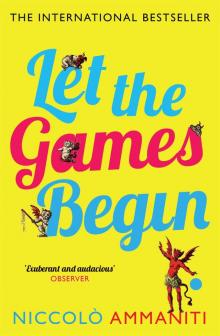 Let the Games Begin
Let the Games Begin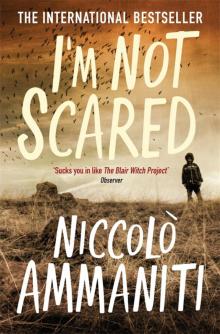 I'm Not Scared
I'm Not Scared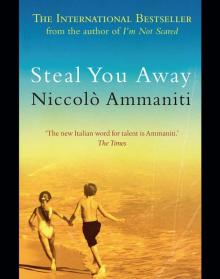 Steal You Away
Steal You Away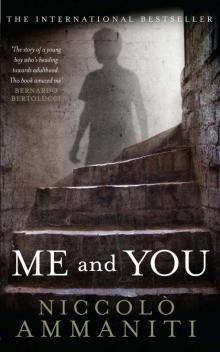 Me and You
Me and You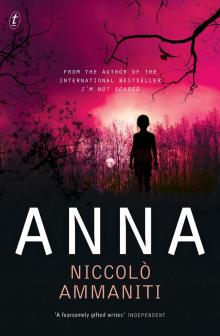 Anna
Anna